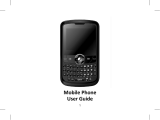Guidelines for safe and efficient use
6
Guidelines for safe and efficient use
Exposure to radio
frequency energy
Radio wave exposure and Specific
Absorption Rate (SAR) information
This mobile phone model KE800 has been
designed to comply with applicable safety
requirements for exposure to radio waves. This
requirement is based on scientific guidelines
that include safety margins designed to assure
the safety of all persons, regardless of age
and health.
] The radio wave exposure guidelines employ
a unit of measurement known as the
Specific Absorption Rate, or SAR. Tests for
SAR are conducted using standardised
methods with the phone transmitting at its
highest certified power level in all used
frequency bands.
] While there may be differences between the
SAR levels of various LG phone models,
they are all designed to meet the relevant
guidelines for exposure to radio waves.
] The SAR limit recommended by the
International Commission on Non-Ionizing
Radiation Protection (ICNIRP) is 2W/kg
averaged over ten (10) gram of tissue.
] The highest SAR value for this model phone
tested by DASY4 for use at the ear is 0.701
W/kg (10g).
] SAR data information for residents in
countries/regions that have adopted the
SAR limit recommended by the Institute of
Electrical and Electronics Engineers (IEEE) is
1.6 W/kg averaged over one (1) gram of
tissue (for example USA, Canada, Australia
and Taiwan).
Product care and
maintenance
WARNING! Only use batteries, chargers and
accessories approved for use with this particular
phone model. The use of any other types may
invalidate the warranty and may be dangerous.
] Do not disassemble this unit. Take it to a
qualified service technician when repair
work is required.
] Keep away from electrical appliances such
as TV's, radios or personal computers.





















